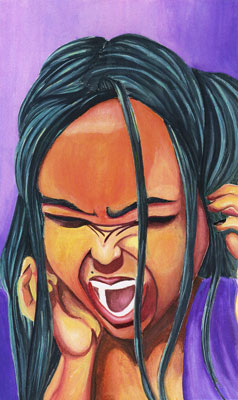All Nonfiction
- Bullying
- Books
- Academic
- Author Interviews
- Celebrity interviews
- College Articles
- College Essays
- Educator of the Year
- Heroes
- Interviews
- Memoir
- Personal Experience
- Sports
- Travel & Culture
All Opinions
- Bullying
- Current Events / Politics
- Discrimination
- Drugs / Alcohol / Smoking
- Entertainment / Celebrities
- Environment
- Love / Relationships
- Movies / Music / TV
- Pop Culture / Trends
- School / College
- Social Issues / Civics
- Spirituality / Religion
- Sports / Hobbies
All Hot Topics
- Bullying
- Community Service
- Environment
- Health
- Letters to the Editor
- Pride & Prejudice
- What Matters
- Back
Summer Guide
- Program Links
- Program Reviews
- Back
College Guide
- College Links
- College Reviews
- College Essays
- College Articles
- Back
How Are You?
So your acquaintance asks, “How are you?” and to relieve them of the burden of an extended reply you say, simply, “Good”. In response, perhaps they nod their head slowly or smile appropriately and toss in a lighthearted laugh. And without another word the conversation is shifted abruptly to an unrelated matter.
You think nothing of it.
The question feels trite to both the questioner and the respondent, but yet we continue to use this crutch day after day, year after year in a monotonous drone of polite monologue. It’s tired, predictable, and frankly, boring. This conversation starter has pervaded our exchanges with one another long enough and urgently needs reconsideration. What was originally a question with the genuine intention of finding out how another person is feeling has deteriorated into an easy ‘fix’ for our lack of creativity when greeting each other.
For the questioner, it’s an automatic slur of a question triggered by wanting to express our manners and kindness or by just not knowing what else to say. Word vomit. Before we even begin to observe the person we’re interacting with, the damage has been done. They say “I’m good, thanks” or another polite but predictable answer and in less than a second you’re back at square one: shifting your feet or adjusting the buttons on your sweater, mustering up the courage to begin a new conversation. Hey the weather’s nice today isn’t it?
As the respondent an agglomeration of potential reactions run through your thoughts. Well actually, I have 3 exams tomorrow and I’m about to blow my brains out... But we settle for “good” because it’s concise and saves us the trouble of rummaging through our vocabulary to find a suitable term. We fear that revealing how we really feel will make us seem weak, dramatic, or too personal. And if in reality we’re not doing “good”, we figure it’s casual enough to slip as a white lie and those never hurt anybody. But just muttering “good” won’t be convincing enough, so to really sell it, we flash a smile until they nod and smile back. Mission accomplished.
So what if it’s a little insincere? It’s the norm in our culture; everyone does it and it’s polite behavior...
However, it is precisely that. The use of this exchange has plagued our society to the point where we’ve become dependent. No longer does it serve its purpose to find out how someone is doing, but has become a reflex we resort to out of mindlessness. And in turn, “good” as reply has lost any meaning at all. Does good mean you’re doing well or you figure it’s a safe alternative to something more authentic? The vagueness in this answer eliminates any potential for an emotional connection with the person you’re conversing with; if they don’t understand how you’re feeling how can they relate to you? How can you expect them to relate to you? And besides, you’re more interesting than that.
As the inventors of language itself, we have the unchallenged power to eliminate language that no longer serves a purpose. With some bravery, a little conscious effort, and even just a smidge of creativity, we can begin to reverse the damage and actually start to reconnect with others on a basic, human level.
Lets put our brains into it people.

Similar Articles
JOIN THE DISCUSSION
This article has 1 comment.
